Physical Activity Researcher
Hello and Welcome to Physical Activity Researcher Podcast! Physical Activity Researcher Podcast is the source of the latest research findings on all things related to physical activity, exercise, and health. World-renowned scientists and experts as guests in an informal and relaxed interview style format. New episodes on Tuesdays, Fridays, and Sundays. The podcast is for anyone who likes to learn scientific and evidence-based knowledge of physical activity, exercise, and health. Our listeners range from researchers to health and fitness professionals, and from inactive office workers to marathon runners. Podcast has several series and hosts each concentrating on different aspects of physical activity: Physical Activity Researcher Series The latest research findings in exercise physiology, biomechanics, physical education, coaching sciences, sport psychology, epidemiology, and public health. These episodes are hosted by researcher and entrepreneur Dr Olli Tikkanen. Meaningful Sport Series Meaningful Sport is dedicated to the exploration of meaning and meaningful experiences in sport and physical activity. Many studies have revealed instrumental benefits of physical activity, but is there something more to it, and how does it contribute to meaningful lives? This series is led by Associate Professor Noora Ronkainen. The series provides inspiration for exploring the meaning and value in sport and physical activity for everyone. Practitioner’s Viewpoint Series Practitioner’s Viewpoint Series has health and fitness professionals as guests. How they see sedentary behaviour and physical activity in their work? What are the best practices to promote physical activity? This series is for you if you are a Personal Trainer, Physiotherapist, Medical Doctor, Health Coach, or anyone working as a health and fitness professional. This series is lead by physiotherapist MSc Liis Kukkonen. Publishing schedule: Tuesdays: Physical Activity Researcher Series Friday: Meaningful Sport Series Sundays: Practitioner’s Viewpoint Series. + Bonus episodes and republications of past highlight episodes We hope you find value in the podcast! -Podcasting team-
Hello and Welcome to Physical Activity Researcher Podcast! Physical Activity Researcher Podcast is the source of the latest research findings on all things related to physical activity, exercise, and health. World-renowned scientists and experts as guests in an informal and relaxed interview style format. New episodes on Tuesdays, Fridays, and Sundays. The podcast is for anyone who likes to learn scientific and evidence-based knowledge of physical activity, exercise, and health. Our listeners range from researchers to health and fitness professionals, and from inactive office workers to marathon runners. Podcast has several series and hosts each concentrating on different aspects of physical activity: Physical Activity Researcher Series The latest research findings in exercise physiology, biomechanics, physical education, coaching sciences, sport psychology, epidemiology, and public health. These episodes are hosted by researcher and entrepreneur Dr Olli Tikkanen. Meaningful Sport Series Meaningful Sport is dedicated to the exploration of meaning and meaningful experiences in sport and physical activity. Many studies have revealed instrumental benefits of physical activity, but is there something more to it, and how does it contribute to meaningful lives? This series is led by Associate Professor Noora Ronkainen. The series provides inspiration for exploring the meaning and value in sport and physical activity for everyone. Practitioner’s Viewpoint Series Practitioner’s Viewpoint Series has health and fitness professionals as guests. How they see sedentary behaviour and physical activity in their work? What are the best practices to promote physical activity? This series is for you if you are a Personal Trainer, Physiotherapist, Medical Doctor, Health Coach, or anyone working as a health and fitness professional. This series is lead by physiotherapist MSc Liis Kukkonen. Publishing schedule: Tuesdays: Physical Activity Researcher Series Friday: Meaningful Sport Series Sundays: Practitioner’s Viewpoint Series. + Bonus episodes and republications of past highlight episodes We hope you find value in the podcast! -Podcasting team-
Episodes
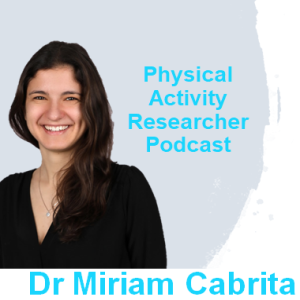
Tuesday Jan 24, 2023
Tuesday Jan 24, 2023
What type of projects want to measure PA?
Considerations when choosing an activity tracker grouped in three main topics:
Participant-centric:
Research and innovation driven
Regulatory
Dr Miriam Cabrita has done her Bachelor and Master degrees at NOVA School of Science and Technology in Portugal, and her PhD in biomedical engineering in University of Twente
Then she has worked at Roessingh Research and Development Center in Netherlands for 8 years coordinating and managing EU research projects related to eHealth
Teaching also courses on Physical Activity, Digital Health and Virtual Coaching at the University of Twente.
She has acted as a Board Member for 5 years in International Society for the Measurement of Physical Behaviour (ISMPB)
Currently she is working as a Chief Customer Officer at Fibion Inc.
_____________________
This podcast episode is sponsored by Fibion Inc. | Better Sleep, Sedentary Behaviour and Physical Activity Research with Less Hassle
---
Collect, store and manage SB and PA data easily and remotely -
Discover ground-breaking Fibion SENS
---
SB and PA measurements, analysis, and feedback made easy.
Learn more about Fibion Research
---
Learn more about Fibion Sleep and Fibion Circadian Rhythm Solutions.
---
Fibion Kids - Activity tracking designed for children.
---
Collect self-report physical activity data easily and cost-effectively with Mimove.
---
Explore our Wearables, Experience sampling method (ESM), Sleep, Heart rate variability (HRV), Sedentary Behavior and Physical Activity article collections for insights on related articles.
---
Refer to our article "Physical Activity and Sedentary Behavior Measurements" for an exploration of active and sedentary lifestyle assessment methods.
---
Learn about actigraphy in our guide: Exploring Actigraphy in Scientific Research: A Comprehensive Guide.
---
Gain foundational ESM insights with "Introduction to Experience Sampling Method (ESM)" for a comprehensive overview.
---
Explore accelerometer use in health research with our article "Measuring Physical Activity and Sedentary Behavior with Accelerometers ".
---
For an introduction to the fundamental aspects of HRV, consider revisiting our Ultimate Guide to Heart Rate Variability.
---
Follow the podcast on Twitter https://twitter.com/PA_Researcher
Follow host Dr Olli Tikkanen on Twitter https://twitter.com/ollitikkanen
Follow Fibion on Twitter https://twitter.com/fibion
https://www.youtube.com/@PA_Researcher
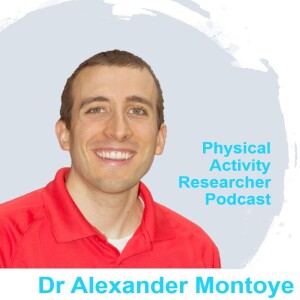
Tuesday Jan 17, 2023
3 Minimal Things Every Validation Study Should Have - Dr Alexander Montoye (Pt1)
Tuesday Jan 17, 2023
Tuesday Jan 17, 2023
Dr Alexander Montoye is working as an Associate professor of Clinical Exercise Physiology at Alma College, Michigan, U.S. His main research area involves physical activity monitoring devices. He studies the accuracy and reliability of various physical activity monitors and also uses them as intervention tools to help individuals become more physically active.
---
Advanced analytic methods (by other research groups), and a repository to make such models easier to find and use.
Pfeiffer KA, Clevenger KA, Kaplan A, Van Camp CA, Strath SJ, Montoye AHK. Accessibility and use of novel methods for predicting physical activity and energy expenditure using accelerometry: A scoping review. Phys Meas. 2022; 43(9). DOI: 10.1088/1361-6579/ac89ca.
Clevenger KA, Montoye AHK, Van Camp CA, Strath SJ, Pfeiffer KA. Methods for estimating physical activity and energy expenditure using raw accelerometry data or novel analytical approaches: A repository, framework, and reporting guidelines. Phys Meas. 2022; 43(9). DOI: 10.1088/1361-6579/ac89c9.
_____________________
This podcast episode is sponsored by Fibion Inc. | Better Sleep, Sedentary Behaviour and Physical Activity Research with Less Hassle
---
Collect, store and manage SB and PA data easily and remotely -
Discover ground-breaking Fibion SENS
---
SB and PA measurements, analysis, and feedback made easy.
Learn more about Fibion Research
---
Learn more about Fibion Sleep and Fibion Circadian Rhythm Solutions.
---
Fibion Kids - Activity tracking designed for children.
---
Collect self-report physical activity data easily and cost-effectively with Mimove.
---
Explore our Wearables, Experience sampling method (ESM), Sleep, Heart rate variability (HRV), Sedentary Behavior and Physical Activity article collections for insights on related articles.
---
Refer to our article "Physical Activity and Sedentary Behavior Measurements" for an exploration of active and sedentary lifestyle assessment methods.
---
Learn about actigraphy in our guide: Exploring Actigraphy in Scientific Research: A Comprehensive Guide.
---
Gain foundational ESM insights with "Introduction to Experience Sampling Method (ESM)" for a comprehensive overview.
---
Explore accelerometer use in health research with our article "Measuring Physical Activity and Sedentary Behavior with Accelerometers ".
---
For an introduction to the fundamental aspects of HRV, consider revisiting our Ultimate Guide to Heart Rate Variability.
---
Follow the podcast on Twitter https://twitter.com/PA_Researcher
Follow host Dr Olli Tikkanen on Twitter https://twitter.com/ollitikkanen
Follow Fibion on Twitter https://twitter.com/fibion
https://www.youtube.com/@PA_Researcher
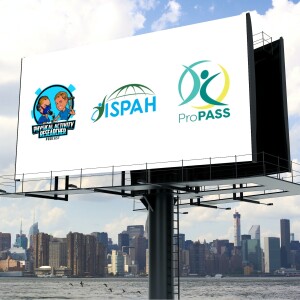
Thursday Jan 12, 2023
Interesting Round Table Discussion (Part 2) - ISPAH & ProPASS Event
Thursday Jan 12, 2023
Thursday Jan 12, 2023
“Towards the 1st device-based guidelines of physical activity, sedentary behavior and sleep.”
Scientific events lead wanted to join PROPASS’ working group:
Speakers: Karen Milton and Jasper Schipperijn and Emmanuel Stamatakis and Jakob Tarp and Annemarie and Peter T Katzmarzyk and Jo Blodgett and Jasper Schipperijn and Karen Milton
Audio podcast of satellite event of the ProPASS consortium-ISPAH partnership: “Towards the 1st device-based guidelines of physical activity, sedentary behavior and sleep
ISPAH Congress 2022 on the 23rd - 26th of October 2022.Over 90% of the evidence used for guidelines development is based on questionnaires. In the last decade there has been a large increase in device-based cohorts that will likely inform the next generation of guidelines. Compared to questionnaires, devices such as accelerometers capture very different aspects of physical activity, posture and sleep. The symposium’s sessions will discuss the strengths and complexities encountered during the transition of future guidelines from questionnaire-based to accelerometer-measured evidence, and will highlight the instrumental role that ProPASS and other analogous consortia can play in enabling a smooth transition towards device-based and truly global physical activity, sedentary behavior, and sleep guidelines.Speakers:Professor Fiona Bull (World Health Organization)Professor Ulf Ekelund (Norwegian School of Sport Sciences & ProPASS)Associate Professor Karen Milton (ISPAH & University of East Anglia)Professor Jasper Schipperijn (ISPAH & University of Southern Denmark)Dr Matthew Ahmadi (University of Sydney & ProPASS)Dr Jo Blodgett (University College London & ProPASS)Professor Emmanuel Stamatakis (University of Sydney & ProPASS)Professor Peter Katzmarzyk (Louisiana State University)
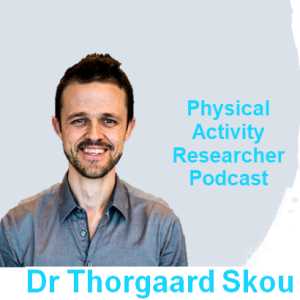
Tuesday Jan 10, 2023
Effects of Exercise on Ostoarthritis - Dr Søren Thorgaard Skou (Pt3)
Tuesday Jan 10, 2023
Tuesday Jan 10, 2023
Søren Thorgaard Skou (PT, MSc, PhD) has vast experience within the field of osteoarthritis and other chronic conditions and has been the principal investigator of several high-quality randomized controlled trials on surgical and non-surgical treatment, one of which was published in The New England Journal of Medicine (impact factor of 79.26), the highest ranked of all general medical journals.
Currently, he is the principal investigator of a randomized, controlled trial of meniscal surgery vs. exercise therapy and education for young people with a meniscal tear (DREAM) and a 5-year EU-funded project (MOBILIZE, grant agreement No 801790) with the overall aim of improving health in people with more than one chronic condition (i.e. multimorbidity) through personalized exercise therapy and education.
Furthermore, he is the co-lead of Exercise First, a research program funded by Region Zealand aimed at developing, testing and implementing initaitives that support that the individual patient received the right prevention and treatment at the right time and to increase self-management using e-health.
He is one of the main architects and leader of the implementation of the highly successful treatment program Good Life With osteoArthritis in Denmark (GLA:D) for patients with knee and hip osteoarthritis.
Furthermore, he is a recipient of a prestigious ERC Starting Grant from the European Research Council, and a postdoc grant and a Sapere Aude Research Talent Award from the Independent Research Fund Denmark.
---
Follow Professor Søren Skou on Twitter https://twitter.com/STSkou
He is affiliated with both University of Southern Denmark and the research unit PROgrez at Slagelse Hospital, Denmark (@PROgrezDK)
_____________________
This podcast episode is sponsored by Fibion Inc. | Better Sleep, Sedentary Behaviour and Physical Activity Research with Less Hassle
---
Collect, store and manage SB and PA data easily and remotely -
Discover ground-breaking Fibion SENS
---
SB and PA measurements, analysis, and feedback made easy.
Learn more about Fibion Research
---
Learn more about Fibion Sleep and Fibion Circadian Rhythm Solutions.
---
Fibion Kids - Activity tracking designed for children.
---
Collect self-report physical activity data easily and cost-effectively with Mimove.
---
Explore our Wearables, Experience sampling method (ESM), Sleep, Heart rate variability (HRV), Sedentary Behavior and Physical Activity article collections for insights on related articles.
---
Refer to our article "Physical Activity and Sedentary Behavior Measurements" for an exploration of active and sedentary lifestyle assessment methods.
---
Learn about actigraphy in our guide: Exploring Actigraphy in Scientific Research: A Comprehensive Guide.
---
Gain foundational ESM insights with "Introduction to Experience Sampling Method (ESM)" for a comprehensive overview.
---
Explore accelerometer use in health research with our article "Measuring Physical Activity and Sedentary Behavior with Accelerometers ".
---
For an introduction to the fundamental aspects of HRV, consider revisiting our Ultimate Guide to Heart Rate Variability.
---
Follow the podcast on Twitter https://twitter.com/PA_Researcher
Follow host Dr Olli Tikkanen on Twitter https://twitter.com/ollitikkanen
Follow Fibion on Twitter https://twitter.com/fibion
https://www.youtube.com/@PA_Researcher

Thursday Jan 05, 2023
Interesting Round Table Discussion (Part 1) - ISPAH & ProPASS Event
Thursday Jan 05, 2023
Thursday Jan 05, 2023
Scientific events lead wanted to join PROPASS’ working group:
Speakers: Marie Murphy and Peter Katzmarzyk and Jasper Schipperijn and Karen Milton and Emmanuel Stamatakis and Jakob Tarp and Annemarie Koster
Audio podcast of satellite event of the ProPASS consortium-ISPAH partnership: “Towards the 1st device-based guidelines of physical activity, sedentary behavior and sleep
ISPAH Congress 2022 on the 23rd - 26th of October 2022.Over 90% of the evidence used for guidelines development is based on questionnaires. In the last decade there has been a large increase in device-based cohorts that will likely inform the next generation of guidelines. Compared to questionnaires, devices such as accelerometers capture very different aspects of physical activity, posture and sleep. The symposium’s sessions will discuss the strengths and complexities encountered during the transition of future guidelines from questionnaire-based to accelerometer-measured evidence, and will highlight the instrumental role that ProPASS and other analogous consortia can play in enabling a smooth transition towards device-based and truly global physical activity, sedentary behavior, and sleep guidelines.Speakers:Professor Fiona Bull (World Health Organization)Professor Ulf Ekelund (Norwegian School of Sport Sciences & ProPASS)Associate Professor Karen Milton (ISPAH & University of East Anglia)Professor Jasper Schipperijn (ISPAH & University of Southern Denmark)Dr Matthew Ahmadi (University of Sydney & ProPASS)Dr Jo Blodgett (University College London & ProPASS)Professor Emmanuel Stamatakis (University of Sydney & ProPASS)Professor Peter Katzmarzyk (Louisiana State University)
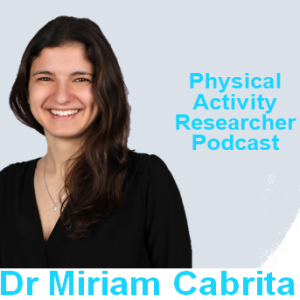
Tuesday Jan 03, 2023
Tuesday Jan 03, 2023
What type of projects want to measure PA?
Considerations when choosing an activity tracker grouped in three main topics:
Participant-centric:
Research and innovation driven
Regulatory
Dr Miriam Cabrita has done her Bachelor and Master degrees at NOVA School of Science and Technology in Portugal, and her PhD in biomedical engineering in University of Twente
Then she has worked at Roessingh Research and Development Center in Netherlands for 8 years coordinating and managing EU research projects related to eHealth
Teaching also courses on Physical Activity, Digital Health and Virtual Coaching at the University of Twente.
She has acted as a Board Member for 5 years in International Society for the Measurement of Physical Behaviour (ISMPB)
Currently she is working as a Chief Customer Officer at Fibion Inc.
_____________________
This podcast episode is sponsored by Fibion Inc. | Better Sleep, Sedentary Behaviour and Physical Activity Research with Less Hassle
---
Collect, store and manage SB and PA data easily and remotely -
Discover ground-breaking Fibion SENS
---
SB and PA measurements, analysis, and feedback made easy.
Learn more about Fibion Research
---
Learn more about Fibion Sleep and Fibion Circadian Rhythm Solutions.
---
Fibion Kids - Activity tracking designed for children.
---
Collect self-report physical activity data easily and cost-effectively with Mimove.
---
Explore our Wearables, Experience sampling method (ESM), Sleep, Heart rate variability (HRV), Sedentary Behavior and Physical Activity article collections for insights on related articles.
---
Refer to our article "Physical Activity and Sedentary Behavior Measurements" for an exploration of active and sedentary lifestyle assessment methods.
---
Learn about actigraphy in our guide: Exploring Actigraphy in Scientific Research: A Comprehensive Guide.
---
Gain foundational ESM insights with "Introduction to Experience Sampling Method (ESM)" for a comprehensive overview.
---
Explore accelerometer use in health research with our article "Measuring Physical Activity and Sedentary Behavior with Accelerometers ".
---
For an introduction to the fundamental aspects of HRV, consider revisiting our Ultimate Guide to Heart Rate Variability.
---
Follow the podcast on Twitter https://twitter.com/PA_Researcher
Follow host Dr Olli Tikkanen on Twitter https://twitter.com/ollitikkanen
Follow Fibion on Twitter https://twitter.com/fibion
https://www.youtube.com/@PA_Researcher

Thursday Dec 29, 2022
Thursday Dec 29, 2022
From measures to guidelines and surveillance Drs Karen Milton and Jasper Schipperijn
Audio podcast of satellite event of the ProPASS consortium-ISPAH partnership: “Towards the 1st device-based guidelines of physical activity, sedentary behavior and sleep
ISPAH Congress 2022 on the 23rd - 26th of October 2022.Over 90% of the evidence used for guidelines development is based on questionnaires. In the last decade there has been a large increase in device-based cohorts that will likely inform the next generation of guidelines. Compared to questionnaires, devices such as accelerometers capture very different aspects of physical activity, posture and sleep. The symposium’s sessions will discuss the strengths and complexities encountered during the transition of future guidelines from questionnaire-based to accelerometer-measured evidence, and will highlight the instrumental role that ProPASS and other analogous consortia can play in enabling a smooth transition towards device-based and truly global physical activity, sedentary behavior, and sleep guidelines.Speakers:Professor Fiona Bull (World Health Organization)Professor Ulf Ekelund (Norwegian School of Sport Sciences & ProPASS)Associate Professor Karen Milton (ISPAH & University of East Anglia)Professor Jasper Schipperijn (ISPAH & University of Southern Denmark)Dr Matthew Ahmadi (University of Sydney & ProPASS)Dr Jo Blodgett (University College London & ProPASS)Professor Emmanuel Stamatakis (University of Sydney & ProPASS)Professor Peter Katzmarzyk (Louisiana State University)
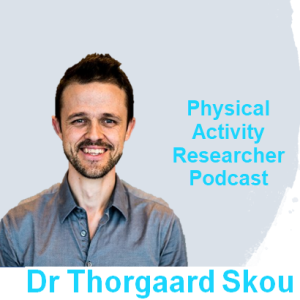
Tuesday Dec 27, 2022
Multimorbidity and Physical Activity - Dr Søren Thorgaard Skou (Pt2)
Tuesday Dec 27, 2022
Tuesday Dec 27, 2022
Søren Thorgaard Skou (PT, MSc, PhD) has vast experience within the field of osteoarthritis and other chronic conditions and has been the principal investigator of several high-quality randomized controlled trials on surgical and non-surgical treatment, one of which was published in The New England Journal of Medicine (impact factor of 79.26), the highest ranked of all general medical journals.
Currently, he is the principal investigator of a randomized, controlled trial of meniscal surgery vs. exercise therapy and education for young people with a meniscal tear (DREAM) and a 5-year EU-funded project (MOBILIZE, grant agreement No 801790) with the overall aim of improving health in people with more than one chronic condition (i.e. multimorbidity) through personalized exercise therapy and education.
Furthermore, he is the co-lead of Exercise First, a research program funded by Region Zealand aimed at developing, testing and implementing initaitives that support that the individual patient received the right prevention and treatment at the right time and to increase self-management using e-health.
He is one of the main architects and leader of the implementation of the highly successful treatment program Good Life With osteoArthritis in Denmark (GLA:D) for patients with knee and hip osteoarthritis.
Furthermore, he is a recipient of a prestigious ERC Starting Grant from the European Research Council, and a postdoc grant and a Sapere Aude Research Talent Award from the Independent Research Fund Denmark.
---
Follow Professor Søren Skou on Twitter https://twitter.com/STSkou
He is affiliated with both University of Southern Denmark and the research unit PROgrez at Slagelse Hospital, Denmark (@PROgrezDK)
_____________________
This podcast episode is sponsored by Fibion Inc. | Better Sleep, Sedentary Behaviour and Physical Activity Research with Less Hassle
---
Collect, store and manage SB and PA data easily and remotely -
Discover ground-breaking Fibion SENS
---
SB and PA measurements, analysis, and feedback made easy.
Learn more about Fibion Research
---
Learn more about Fibion Sleep and Fibion Circadian Rhythm Solutions.
---
Fibion Kids - Activity tracking designed for children.
---
Collect self-report physical activity data easily and cost-effectively with Mimove.
---
Explore our Wearables, Experience sampling method (ESM), Sleep, Heart rate variability (HRV), Sedentary Behavior and Physical Activity article collections for insights on related articles.
---
Refer to our article "Physical Activity and Sedentary Behavior Measurements" for an exploration of active and sedentary lifestyle assessment methods.
---
Learn about actigraphy in our guide: Exploring Actigraphy in Scientific Research: A Comprehensive Guide.
---
Gain foundational ESM insights with "Introduction to Experience Sampling Method (ESM)" for a comprehensive overview.
---
Explore accelerometer use in health research with our article "Measuring Physical Activity and Sedentary Behavior with Accelerometers ".
---
For an introduction to the fundamental aspects of HRV, consider revisiting our Ultimate Guide to Heart Rate Variability.
---
Follow the podcast on Twitter https://twitter.com/PA_Researcher
Follow host Dr Olli Tikkanen on Twitter https://twitter.com/ollitikkanen
Follow Fibion on Twitter https://twitter.com/fibion
https://www.youtube.com/@PA_Researcher

Thursday Dec 22, 2022
Thursday Dec 22, 2022
Device-based evidence for sleep guidelines: how good are accelerometers for sleep measurements? Drs Annemarie Koster and Emmanuel Stamatakis
Audio podcast of satellite event of the ProPASS consortium-ISPAH partnership: “Towards the 1st device-based guidelines of physical activity, sedentary behavior and sleep
ISPAH Congress 2022 on the 23rd - 26th of October 2022.Over 90% of the evidence used for guidelines development is based on questionnaires. In the last decade there has been a large increase in device-based cohorts that will likely inform the next generation of guidelines. Compared to questionnaires, devices such as accelerometers capture very different aspects of physical activity, posture and sleep. The symposium’s sessions will discuss the strengths and complexities encountered during the transition of future guidelines from questionnaire-based to accelerometer-measured evidence, and will highlight the instrumental role that ProPASS and other analogous consortia can play in enabling a smooth transition towards device-based and truly global physical activity, sedentary behavior, and sleep guidelines.Speakers:Professor Fiona Bull (World Health Organization)Professor Ulf Ekelund (Norwegian School of Sport Sciences & ProPASS)Associate Professor Karen Milton (ISPAH & University of East Anglia)Professor Jasper Schipperijn (ISPAH & University of Southern Denmark)Dr Matthew Ahmadi (University of Sydney & ProPASS)Dr Jo Blodgett (University College London & ProPASS)Professor Emmanuel Stamatakis (University of Sydney & ProPASS)Professor Peter Katzmarzyk (Louisiana State University)
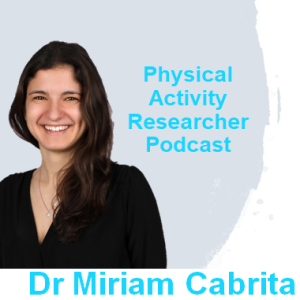
Sunday Dec 18, 2022
Sunday Dec 18, 2022
Learn more about Fibion Student Lab: https://fibion.com/studentlab
For any questions and quote, please contact Dr Miriam Cabrita at miriam.cabrita@fibion.com
---
Dr Miriam Cabrita has done her Bachelor and Master degrees at NOVA School of Science and Technology in Portugal, and her PhD in biomedical engineering in University of Twente
Then she has worked at Roessingh Research and Development Center in Netherlands for 8 years coordinating and managing EU research projects related to eHealth
Teaching also courses on Physical Activity, Digital Health and Virtual Coaching at the University of Twente.
She has acted as a Board Member for 5 years in International Society for the Measurement of Physical Behaviour (ISMPB)
Currently she is working as a Chief Customer Officer at Fibion Inc.
_____________________
This podcast episode is sponsored by Fibion Inc. | Better Sleep, Sedentary Behaviour and Physical Activity Research with Less Hassle
---
Collect, store and manage SB and PA data easily and remotely -
Discover ground-breaking Fibion SENS
---
SB and PA measurements, analysis, and feedback made easy.
Learn more about Fibion Research
---
Learn more about Fibion Sleep and Fibion Circadian Rhythm Solutions.
---
Fibion Kids - Activity tracking designed for children.
---
Collect self-report physical activity data easily and cost-effectively with Mimove.
---
Explore our Wearables, Experience sampling method (ESM), Sleep, Heart rate variability (HRV), Sedentary Behavior and Physical Activity article collections for insights on related articles.
---
Refer to our article "Physical Activity and Sedentary Behavior Measurements" for an exploration of active and sedentary lifestyle assessment methods.
---
Learn about actigraphy in our guide: Exploring Actigraphy in Scientific Research: A Comprehensive Guide.
---
Gain foundational ESM insights with "Introduction to Experience Sampling Method (ESM)" for a comprehensive overview.
---
Explore accelerometer use in health research with our article "Measuring Physical Activity and Sedentary Behavior with Accelerometers ".
---
For an introduction to the fundamental aspects of HRV, consider revisiting our Ultimate Guide to Heart Rate Variability.
---
Follow the podcast on Twitter https://twitter.com/PA_Researcher
Follow host Dr Olli Tikkanen on Twitter https://twitter.com/ollitikkanen
Follow Fibion on Twitter https://twitter.com/fibion
https://www.youtube.com/@PA_Researcher

Thursday Dec 15, 2022
Thursday Dec 15, 2022
Physical activity guidelines for Americans: Perspective on device-based guidelines. Professor Peter T Katzmarzyk
Audio podcast of satellite event of the ProPASS consortium-ISPAH partnership: “Towards the 1st device-based guidelines of physical activity, sedentary behavior and sleep
ISPAH Congress 2022 on the 23rd - 26th of October 2022.Over 90% of the evidence used for guidelines development is based on questionnaires. In the last decade there has been a large increase in device-based cohorts that will likely inform the next generation of guidelines. Compared to questionnaires, devices such as accelerometers capture very different aspects of physical activity, posture and sleep. The symposium’s sessions will discuss the strengths and complexities encountered during the transition of future guidelines from questionnaire-based to accelerometer-measured evidence, and will highlight the instrumental role that ProPASS and other analogous consortia can play in enabling a smooth transition towards device-based and truly global physical activity, sedentary behavior, and sleep guidelines.Speakers:Professor Fiona Bull (World Health Organization)Professor Ulf Ekelund (Norwegian School of Sport Sciences & ProPASS)Associate Professor Karen Milton (ISPAH & University of East Anglia)Professor Jasper Schipperijn (ISPAH & University of Southern Denmark)Dr Matthew Ahmadi (University of Sydney & ProPASS)Dr Jo Blodgett (University College London & ProPASS)Professor Emmanuel Stamatakis (University of Sydney & ProPASS)Professor Peter Katzmarzyk (Louisiana State University)

Tuesday Dec 13, 2022
Tuesday Dec 13, 2022
Christina Reynolds, PhD
Christina Reynolds received her Ph.D. in astrophysics from University College London and a Master's degree in software engineering from Harvard University. She has been a Data Scientist with ORCATECH with a focus on developing algorithms for the analysis of ORCATECH's large and diverse data set.
Much of her research career has involved developing software algorithms used to fabricate and test the optics for the European Extremely Large Telescope and the IRIS space telescope. At ORCATECH, she focused on designing a wide variety of algorithms for deriving information about life and health patterns from ORCATECH’s sensor data, including characterizing activity and sleep behaviors.
_____________________
This podcast episode is sponsored by Fibion Inc. | Better Sleep, Sedentary Behaviour and Physical Activity Research with Less Hassle
---
Collect, store and manage SB and PA data easily and remotely -
Discover ground-breaking Fibion SENS
---
SB and PA measurements, analysis, and feedback made easy.
Learn more about Fibion Research
---
Learn more about Fibion Sleep and Fibion Circadian Rhythm Solutions.
---
Fibion Kids - Activity tracking designed for children.
---
Collect self-report physical activity data easily and cost-effectively with Mimove.
---
Explore our Wearables, Experience sampling method (ESM), Sleep, Heart rate variability (HRV), Sedentary Behavior and Physical Activity article collections for insights on related articles.
---
Refer to our article "Physical Activity and Sedentary Behavior Measurements" for an exploration of active and sedentary lifestyle assessment methods.
---
Learn about actigraphy in our guide: Exploring Actigraphy in Scientific Research: A Comprehensive Guide.
---
Gain foundational ESM insights with "Introduction to Experience Sampling Method (ESM)" for a comprehensive overview.
---
Explore accelerometer use in health research with our article "Measuring Physical Activity and Sedentary Behavior with Accelerometers ".
---
For an introduction to the fundamental aspects of HRV, consider revisiting our Ultimate Guide to Heart Rate Variability.
---
Follow the podcast on Twitter https://twitter.com/PA_Researcher
Follow host Dr Olli Tikkanen on Twitter https://twitter.com/ollitikkanen
Follow Fibion on Twitter https://twitter.com/fibion
https://www.youtube.com/@PA_Researcher
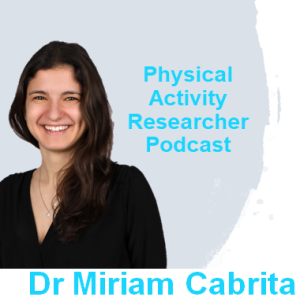
Sunday Dec 11, 2022
Sunday Dec 11, 2022
Learn more about Fibion Student Lab: https://fibion.com/studentlab
For any questions and quote, please contact Dr Miriam Cabrita at miriam.cabrita@fibion.com
---
Dr Miriam Cabrita has done her Bachelor and Master degrees at NOVA School of Science and Technology in Portugal, and her PhD in biomedical engineering in University of Twente
Then she has worked at Roessingh Research and Development Center in Netherlands for 8 years coordinating and managing EU research projects related to eHealth
Teaching also courses on Physical Activity, Digital Health and Virtual Coaching at the University of Twente.
She has acted as a Board Member for 5 years in International Society for the Measurement of Physical Behaviour (ISMPB)
Currently she is working as a Chief Customer Officer at Fibion Inc.
_____________________
This podcast episode is sponsored by Fibion Inc. | Better Sleep, Sedentary Behaviour and Physical Activity Research with Less Hassle
---
Collect, store and manage SB and PA data easily and remotely -
Discover ground-breaking Fibion SENS
---
SB and PA measurements, analysis, and feedback made easy.
Learn more about Fibion Research
---
Learn more about Fibion Sleep and Fibion Circadian Rhythm Solutions.
---
Fibion Kids - Activity tracking designed for children.
---
Collect self-report physical activity data easily and cost-effectively with Mimove.
---
Explore our Wearables, Experience sampling method (ESM), Sleep, Heart rate variability (HRV), Sedentary Behavior and Physical Activity article collections for insights on related articles.
---
Refer to our article "Physical Activity and Sedentary Behavior Measurements" for an exploration of active and sedentary lifestyle assessment methods.
---
Learn about actigraphy in our guide: Exploring Actigraphy in Scientific Research: A Comprehensive Guide.
---
Gain foundational ESM insights with "Introduction to Experience Sampling Method (ESM)" for a comprehensive overview.
---
Explore accelerometer use in health research with our article "Measuring Physical Activity and Sedentary Behavior with Accelerometers ".
---
For an introduction to the fundamental aspects of HRV, consider revisiting our Ultimate Guide to Heart Rate Variability.
---
Follow the podcast on Twitter https://twitter.com/PA_Researcher
Follow host Dr Olli Tikkanen on Twitter https://twitter.com/ollitikkanen
Follow Fibion on Twitter https://twitter.com/fibion
https://www.youtube.com/@PA_Researcher
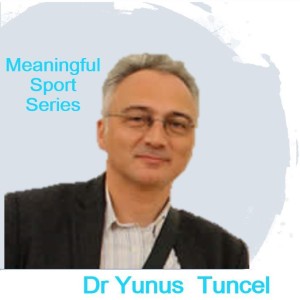
Friday Dec 09, 2022
Friday Dec 09, 2022
This is the second part of our conversation with Dr Yunus Tuncel on philosophical approaches to emotions in sport. We explore how Kierkegaard's and Heidegger's account of anxiety can be applied to think of risk sports, discuss violence and aggression, and finish up on how to care for emotions in sport from a more practical perspective.
Our conversation draws heavily on Yunus's book Emotion in Sports: Philosophical Perspectives.
Dr Yunus Tuncel teaches Philosophy at The New School, New York, and in New York University’s Liberal Studies Programme. He is a co-founder of the Nietzsche Circle and a member of the Editorial Board of its journal The Agonist. Yunus is also the founder of Philomobile, which is a travel organisation offering trips to those interested in studying philosophy on the road (http://www.philomobile.com/).
---
Found the episode interesting? Our previous conversation with Yunus can be found here: Part 1, Part 2. Related conversation on risk sports and authentic existence with Prof. Gunnar Breivik is here.

Thursday Dec 08, 2022
Thursday Dec 08, 2022
Findings from ProPASS’ proof-of-concept IPD analyses: device-measured movement & cardiometabolic outcomes. Drs Jo Blodgett and Matthew Ahmadi.
Audio podcast of satellite event of the ProPASS consortium-ISPAH partnership: “Towards the 1st device-based guidelines of physical activity, sedentary behavior and sleep
ISPAH Congress 2022 on the 23rd - 26th of October 2022.Over 90% of the evidence used for guidelines development is based on questionnaires. In the last decade there has been a large increase in device-based cohorts that will likely inform the next generation of guidelines. Compared to questionnaires, devices such as accelerometers capture very different aspects of physical activity, posture and sleep. The symposium’s sessions will discuss the strengths and complexities encountered during the transition of future guidelines from questionnaire-based to accelerometer-measured evidence, and will highlight the instrumental role that ProPASS and other analogous consortia can play in enabling a smooth transition towards device-based and truly global physical activity, sedentary behavior, and sleep guidelines.Speakers:Professor Fiona Bull (World Health Organization)Professor Ulf Ekelund (Norwegian School of Sport Sciences & ProPASS)Associate Professor Karen Milton (ISPAH & University of East Anglia)Professor Jasper Schipperijn (ISPAH & University of Southern Denmark)Dr Matthew Ahmadi (University of Sydney & ProPASS)Dr Jo Blodgett (University College London & ProPASS)Professor Emmanuel Stamatakis (University of Sydney & ProPASS)Professor Peter Katzmarzyk (Louisiana State University)

Tuesday Dec 06, 2022
Tuesday Dec 06, 2022
Christina Reynolds, PhD
Christina Reynolds received her Ph.D. in astrophysics from University College London and a Master's degree in software engineering from Harvard University. She has been a Data Scientist with ORCATECH with a focus on developing algorithms for the analysis of ORCATECH's large and diverse data set.
Much of her research career has involved developing software algorithms used to fabricate and test the optics for the European Extremely Large Telescope and the IRIS space telescope. At ORCATECH, she focused on designing a wide variety of algorithms for deriving information about life and health patterns from ORCATECH’s sensor data, including characterizing activity and sleep behaviors.
_____________________
This podcast episode is sponsored by Fibion Inc. | Better Sleep, Sedentary Behaviour and Physical Activity Research with Less Hassle
---
Collect, store and manage SB and PA data easily and remotely -
Discover ground-breaking Fibion SENS
---
SB and PA measurements, analysis, and feedback made easy.
Learn more about Fibion Research
---
Learn more about Fibion Sleep and Fibion Circadian Rhythm Solutions.
---
Fibion Kids - Activity tracking designed for children.
---
Collect self-report physical activity data easily and cost-effectively with Mimove.
---
Explore our Wearables, Experience sampling method (ESM), Sleep, Heart rate variability (HRV), Sedentary Behavior and Physical Activity article collections for insights on related articles.
---
Refer to our article "Physical Activity and Sedentary Behavior Measurements" for an exploration of active and sedentary lifestyle assessment methods.
---
Learn about actigraphy in our guide: Exploring Actigraphy in Scientific Research: A Comprehensive Guide.
---
Gain foundational ESM insights with "Introduction to Experience Sampling Method (ESM)" for a comprehensive overview.
---
Explore accelerometer use in health research with our article "Measuring Physical Activity and Sedentary Behavior with Accelerometers ".
---
For an introduction to the fundamental aspects of HRV, consider revisiting our Ultimate Guide to Heart Rate Variability.
---
Follow the podcast on Twitter https://twitter.com/PA_Researcher
Follow host Dr Olli Tikkanen on Twitter https://twitter.com/ollitikkanen
Follow Fibion on Twitter https://twitter.com/fibion
https://www.youtube.com/@PA_Researcher
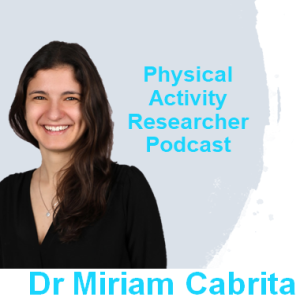
Sunday Dec 04, 2022
Sunday Dec 04, 2022
Learn more about Fibion Student Lab: https://fibion.com/studentlab
For any questions and quote, please contact Dr Miriam Cabrita at miriam.cabrita@fibion.com
---
Dr Miriam Cabrita has done her Bachelor and Master degrees at NOVA School of Science and Technology in Portugal, and her PhD in biomedical engineering in University of Twente
Then she has worked at Roessingh Research and Development Center in Netherlands for 8 years coordinating and managing EU research projects related to eHealth
Teaching also courses on Physical Activity, Digital Health and Virtual Coaching at the University of Twente.
She has acted as a Board Member for 5 years in International Society for the Measurement of Physical Behaviour (ISMPB)
Currently she is working as a Chief Customer Officer at Fibion Inc.
_____________________
This podcast episode is sponsored by Fibion Inc. | Better Sleep, Sedentary Behaviour and Physical Activity Research with Less Hassle
---
Learn more about Fibion Sleep and Circadian Rhythm Solutions:
https://sleepmeasurements.fibion.com/
---
Collect, store and manage SB and PA data easily and remotely -
Discover groundbreaking Fibion SENS: https://sens.fibion.com/
---
SB and PA measurements, analysis, and feedback made easy.
Learn more about Fibion Research : fibion.com/research
---
Follow Fibion on Twitter https://twitter.com/fibion
Follow host Dr Olli Tikkanen on Twitter https://twitter.com/ollitikkanen
Follow the podcast on Twitter https://twitter.com/PA_Researcher

Friday Dec 02, 2022
Friday Dec 02, 2022
In this episode, we explore emotions in sport from a philosophical perspective. How are philosophical perspectives different from the more established psychological perspectives? How can ideas found in Aristotle, Nietzsche, Hume and Spinoza help us establish a framework to explore emotions in sport? Why are certain emotions and their balance essential for sustaining our sporting culture as we know it today, or could we find a better emotional balance in our individual and collective sporting lives?
Our conversation draws heavily on Yunus's book Emotion in Sports: Philosophical Perspectives.
Dr Yunus Tuncel teaches Philosophy at The New School, New York, and in New York University’s Liberal Studies Programme. He is a co-founder of the Nietzsche Circle and a member of the Editorial Board of its journal The Agonist. Yunus is also the founder of Philomobile, which is a travel organisation offering trips to those interested in studying philosophy on the road (http://www.philomobile.com/).
The conversation continues in Part 2 with a focus on more specific emotions such as anxiety, fear, anger and joy in sport.
---
Found the episode interesting? Our previous conversation with Yunus can be found here: Part 1, Part 2. Related conversation on risk sports and authentic existence with Prof. Gunnar Breivik is here.

Thursday Dec 01, 2022
Thursday Dec 01, 2022
Dr. Jakob Tarp: analyses of harmonized device-based data
Fiona Bull: PROPASS online satellite meeting [ISPAH 2022]. Towards the 1st device-based guidelines of physical activity, sedentary behavior and sleep. Introduction from WHO.
Audio podcast of satellite event of the ProPASS consortium-ISPAH partnership: “Towards the 1st device-based guidelines of physical activity, sedentary behavior and sleep
ISPAH Congress 2022 on the 23rd - 26th of October 2022.Over 90% of the evidence used for guidelines development is based on questionnaires. In the last decade there has been a large increase in device-based cohorts that will likely inform the next generation of guidelines. Compared to questionnaires, devices such as accelerometers capture very different aspects of physical activity, posture and sleep. The symposium’s sessions will discuss the strengths and complexities encountered during the transition of future guidelines from questionnaire-based to accelerometer-measured evidence, and will highlight the instrumental role that ProPASS and other analogous consortia can play in enabling a smooth transition towards device-based and truly global physical activity, sedentary behavior, and sleep guidelines.Speakers:Professor Fiona Bull (World Health Organization)Professor Ulf Ekelund (Norwegian School of Sport Sciences & ProPASS)Associate Professor Karen Milton (ISPAH & University of East Anglia)Professor Jasper Schipperijn (ISPAH & University of Southern Denmark)Dr Matthew Ahmadi (University of Sydney & ProPASS)Dr Jo Blodgett (University College London & ProPASS)Professor Emmanuel Stamatakis (University of Sydney & ProPASS)Professor Peter Katzmarzyk (Louisiana State University)

Tuesday Nov 29, 2022
Tuesday Nov 29, 2022
What type of projects want to measure PA?
Considerations when choosing an activity tracker grouped in three main topics:
Participant-centric:
Research and innovation driven
Regulatory
Dr Miriam Cabrita has done her Bachelor and Master degrees at NOVA School of Science and Technology in Portugal, and her PhD in biomedical engineering in University of Twente
Then she has worked at Roessingh Research and Development Center in Netherlands for 8 years coordinating and managing EU research projects related to eHealth
Teaching also courses on Physical Activity, Digital Health and Virtual Coaching at the University of Twente.
She has acted as a Board Member for 5 years in International Society for the Measurement of Physical Behaviour (ISMPB)
Currently she is working as a Chief Customer Officer at Fibion Inc.
_____________________
This podcast episode is sponsored by Fibion Inc. | Better Sleep, Sedentary Behaviour and Physical Activity Research with Less Hassle
---
Learn more about Fibion Sleep and Circadian Rhythm Solutions:
https://sleepmeasurements.fibion.com/
---
Collect, store and manage SB and PA data easily and remotely -
Discover groundbreaking Fibion SENS: https://sens.fibion.com/
---
SB and PA measurements, analysis, and feedback made easy.
Learn more about Fibion Research : fibion.com/research
---
Follow Fibion on Twitter https://twitter.com/fibion
Follow host Dr Olli Tikkanen on Twitter https://twitter.com/ollitikkanen
Follow the podcast on Twitter https://twitter.com/PA_Researcher

Friday Nov 25, 2022
Friday Nov 25, 2022
Audio podcast of satellite event of the ProPASS consortium-ISPAH partnership: “Towards the 1st device-based guidelines of physical activity, sedentary behavior and sleep
ISPAH Congress 2022 on the 23rd - 26th of October 2022.Over 90% of the evidence used for guidelines development is based on questionnaires. In the last decade there has been a large increase in device-based cohorts that will likely inform the next generation of guidelines. Compared to questionnaires, devices such as accelerometers capture very different aspects of physical activity, posture and sleep. The symposium’s sessions will discuss the strengths and complexities encountered during the transition of future guidelines from questionnaire-based to accelerometer-measured evidence, and will highlight the instrumental role that ProPASS and other analogous consortia can play in enabling a smooth transition towards device-based and truly global physical activity, sedentary behavior, and sleep guidelines.Speakers:Professor Fiona Bull (World Health Organization)Professor Ulf Ekelund (Norwegian School of Sport Sciences & ProPASS)Associate Professor Karen Milton (ISPAH & University of East Anglia)Professor Jasper Schipperijn (ISPAH & University of Southern Denmark)Dr Matthew Ahmadi (University of Sydney & ProPASS)Dr Jo Blodgett (University College London & ProPASS)Professor Emmanuel Stamatakis (University of Sydney & ProPASS)Professor Peter Katzmarzyk (Louisiana State University)
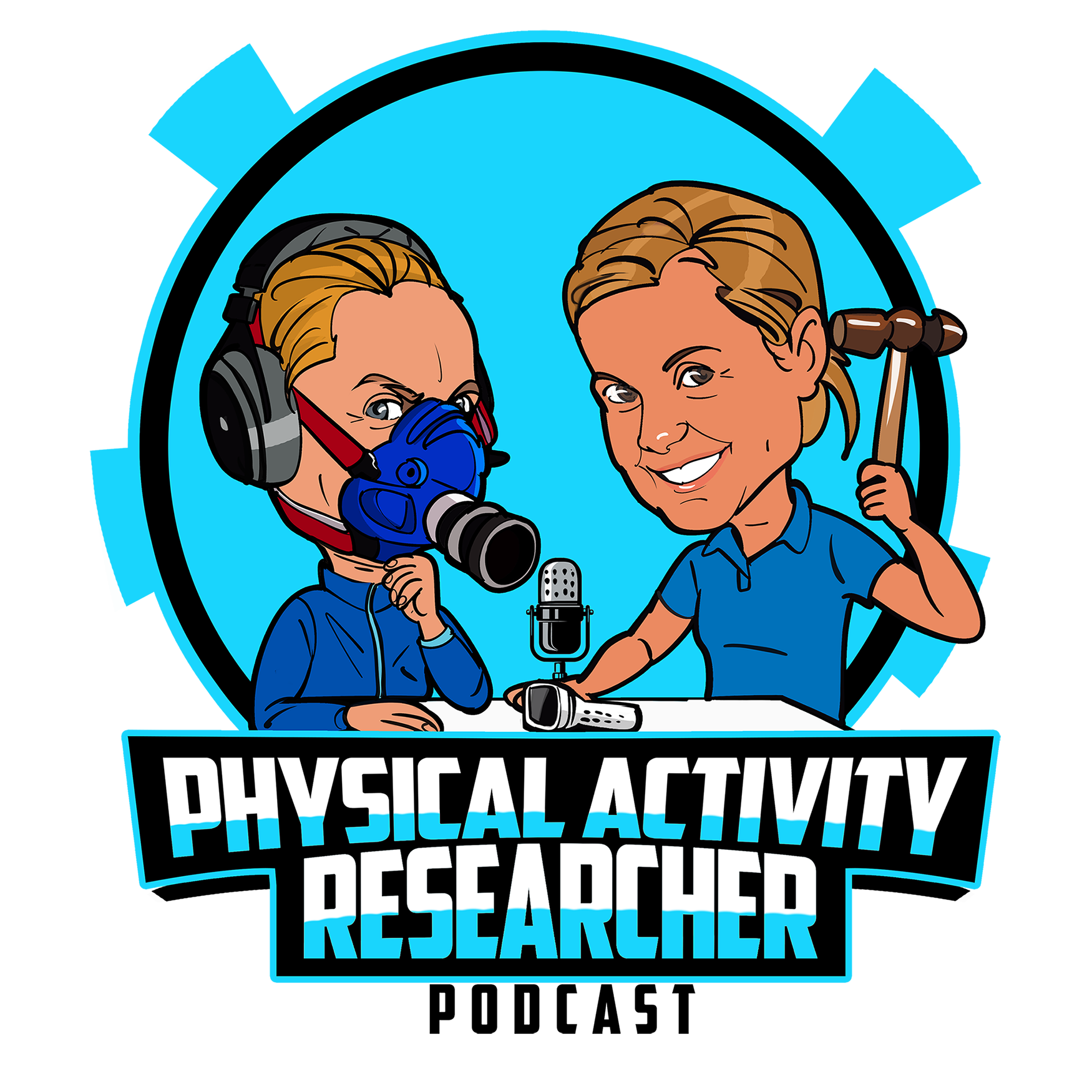
Hello and Welcome to Physical Activity Researcher Podcast!
Physical Activity Researcher Podcast is the source of the latest research findings on all things related to physical activity, exercise, and health. World-renowned scientists and experts as guests in an informal and relaxed interview style format. The podcast is for anyone who likes to learn scientific and evidence-based knowledge of physical activity, exercise, and health.
Physical Activity Researcher Series
The latest research findings in exercise physiology, physical education, coaching sciences, sport psychology, epidemiology, and public health.
Meaningful Sport Series
Meaningful Sport is dedicated to the exploration of meaning and meaningful experiences in sport and physical activity.
Practitioner’s Viewpoint Series
Practitioner’s Viewpoint Series has health and fitness professionals as guests. This series is for you if you are a Personal Trainer, Physiotherapist, Medical Doctor, Health Coach, or anyone working as a health and fitness professional.
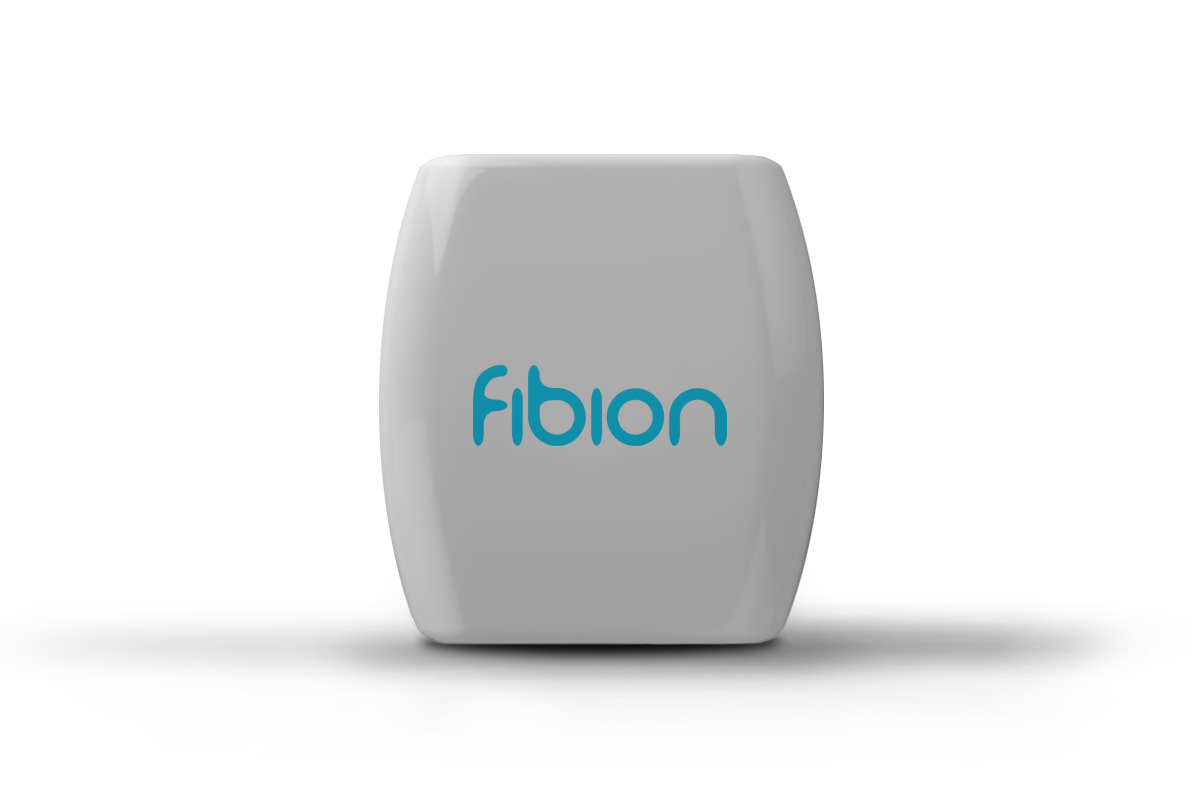
Podcast brought to you by
Fibion
Fibion is the new gold standard for sedentary behaviour and physical activity data collection for researchers. Cloud-based modern solutions make data collection easier than it has never been.
---
Fibion Pro is the first physical activity analysis product targeted from the beginning for health and fitness professionals. It is accurate and easy to use in connection with professional consultation meetings.
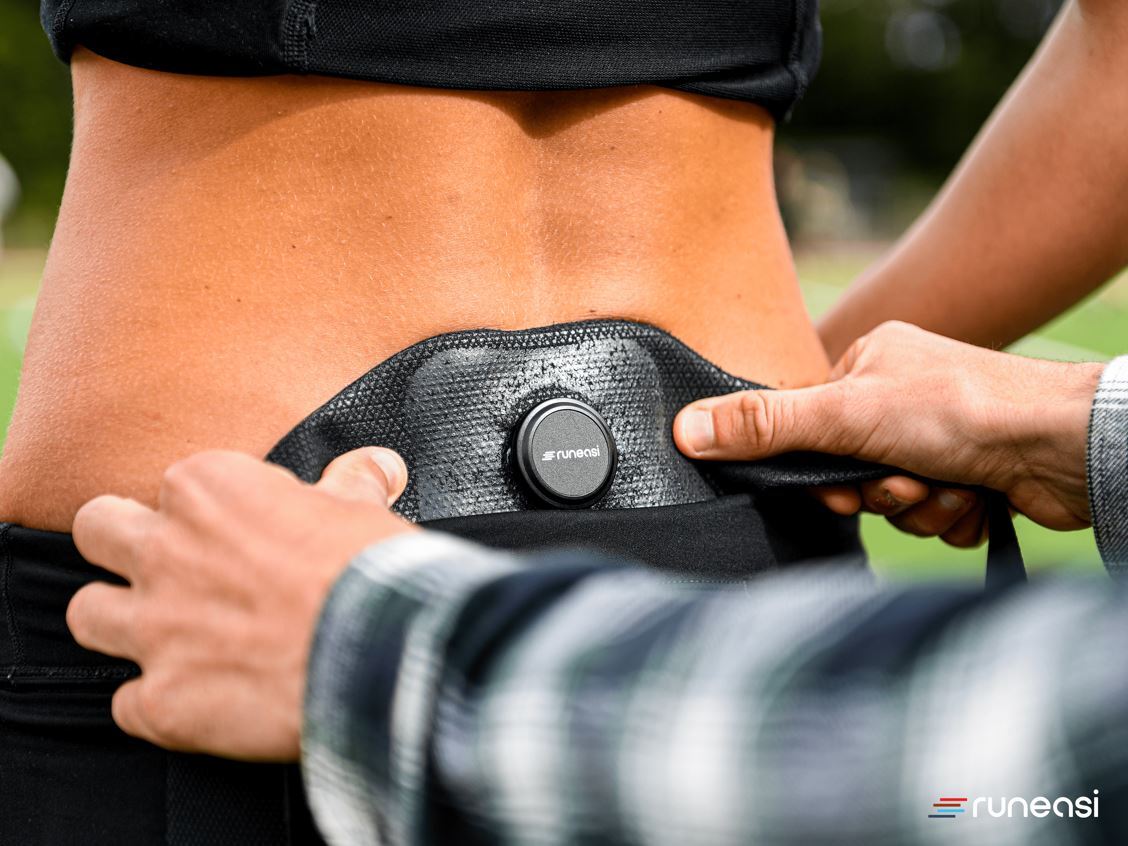
Practitioner's Viewpoint Series Brought to You by
Runeasi
Enabling value-based gait analysis for athletes with musculoskeletal conditions.
1. ASSESS
Runeasi’s real-time functionality gives you immediate and objective visual feedback about how well your patients are moving. Hence, you can immediately identify problem areas, weak links, or poor running technique.
2. ANALYZE
Test your verbal cues out on your patients as you guide them through rehabilitation and return to play/sport. Correct with confidence and surety in knowing what works for them.
3. ADDRESS
Help your patients emerge stronger than ever by giving personalized feedback on important technical parameters like impact asymmetry. Runeasi will help you improve your patients running technique and their ability to achieve your sporting goals!
Learn more: https://runeasi.ai
Book a free demo: https://calendly.com/runeasi/30min






